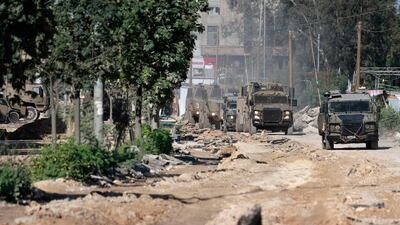Live updates: Follow the latest news on Israel-Gaza
Mamoud Rimouni, a juice seller, presses aged pomegranates at the entrance to Jerash's Greco-Roman ruins, north of Jordan's capital, Amman.
With few tourists and visitors, sales of his $3 juice cups remain low.
“There is not enough business to keep the stock fresh,” says Mr Rimouni.
The decline in his sales is linked to the five-month Israel-Gaza war, which has caused a sharp drop in the number of tourists visiting neighbouring Jordan.
The repercussions of the war extend beyond economics; the kingdom also struggles with political implications and fears of further destabilisation.
Jordan, like Egypt, has a significant stake in the conflict due to its political and familial links with Palestine.
Stability in Jordan, which has a peace treaty with Israel and is dependent on the US for aid and security, holds significant international weight.
This is due to the country’s position close to Israel, its long borders with the oil-rich interior of Arabia, and a ruling system seen as a bulwark against religious extremism.
But it has been the links to Palestine that have outwardly defined the politics of the kingdom since its foundation as a British protectorate in 1921.
Its demography changed after the first wave of Palestinian refugees in 1948.
A large proportion of Jordan’s population became of Palestinian origin. This rose after the 1967 Middle East War, which ushered another wave.
While Egypt is focused on preventing a long-term refugee spillover from Gaza, Jordan is more concerned about deterioration in the West Bank.
Authorities in Amman fear that the war could turn Iran-backed Hamas into the dominant power in the area, observers say.
The unresolved issue of President Mahmoud Abbas’s succession could result in a civil war, they say. This is in addition to rising Israeli violence against Palestinians in the region.
Israel's continued bombardment could lead to a renewed refugee wave, affecting an unwritten covenant in Jordan between the monarchy, led by King Abdullah, and the East Bank tribes.
These tribes, present before Jordan came into being, played a main role in its foundation.
Balancing act
A key role for the monarchy has been to maintain an equilibrium between the tribes, who underpin the security forces and the kingdom's public sector, and the Palestinian immigrants and their offspring, regarded as the driving force behind the country's economy.
A diplomat who was recently briefed by officials in Amman says King Abdullah has secured “strong American support on the need for stability in the West Bank”.
“Other than that, there is little that Jordan can do,” he says.
But in the past 48 hours, Israeli forces have killed 11 people in the West Bank, according to Palestinian officials.
Saud Sharafat, a former senior member of Jordanian Intelligence, says the best scenario Jordan can practically hope for is “for the situation in the West Bank not to explode”.
He says that some international powers do not want the complete disintegration of Hamas for fear that it could be replaced by more extreme powers.
But Jordan, he says, is wary of Hamas's expansion too close to its borders, and emboldening the Jordanian Muslim Brotherhood and its sympathisers in the country.
Unlike most other Arab countries, the Muslim Brotherhood is not banned in Jordan, although a crackdown by the authorities in the last decade has made the group less vocal.
Authorities also regard a Hamas West Bank sweep politically damaging for the Palestinians, says Mr Sharafat, who heads the Shorufat Center for Globalisation and Terrorism Studies in Amman.
It would mean wiping out a diplomatically experienced Palestinian leadership, who have no qualms about direct negotiations with Israel, in case the peace process was relaunched, he says.
Despite a bleak picture west of the River Jordan, Mr Sharafat says threats related to the Gaza war on other fronts have lessened.
A US show of force after a deadly attack by pro-Iranian militia in Syria on an American base in the Jordanian desert appears to have neutralised their threat, he says.
Another issue worrying Jordan is that Israel could pierce the Arab opposition to the Gaza invasion by striking a deal with Saudi Arabia.
A normalisation of ties between the two countries has been a major goal of US policy since the Donald Trump administration.
But Saudi Arabia has made it clear that it will not proceed with the normalisation as long as the war in Gaza continues.


